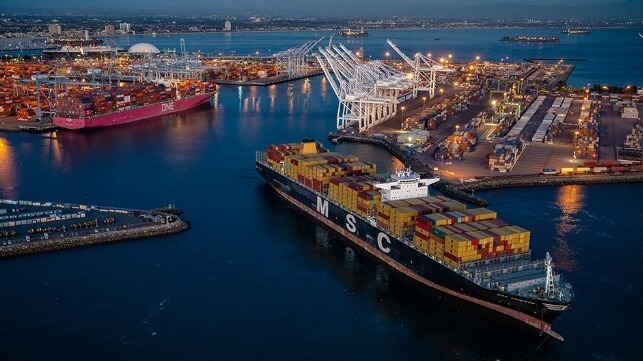California's Five Container Ports to Develop Data Sharing System

In a first-of-its-kind initiative headed up by the State of California, the five major container ports have agreed to work together to launch the California Port Data Partnership. The goal is to jointly advance computerized and cloud-based data interoperability with a common goal of supporting improved freight system resilience, goods movement efficiency, emissions reduction, and economic competitiveness.
It is the latest in a series of initiatives launched by California and the U.S. federal government in response to the massive backlogs and supply chain disruptions that developed during the past few years as volumes surged. The California Legislature approved $27 million in grant funds as part of the Budget Act of 2022 for the development of a port data system designed to improve the movement of goods throughout the state and fortify the supply chains.
The Port of Los Angeles and the Port of Long Beach, which account for the largest portion of the state’s container volume were joined by the Port of Oakland as well as the Port of Hueneme and the Port of San Diego in signing a Memorandum of Understanding on April 26 for the launch of the California Port Data Partnership.
California Lieutenant Governor Eleni Kounalakis said during the signing ceremony that the collaborative data system between all the state’s containerized cargo ports would help to create a greener, more transparent, and more efficient supply chain, unlocking innovation in how cargo moves in California.
“The MOU is a first-of-its-kind agreement on data system development among containerized ports and outlines eleven areas of cooperation, ranging from developing data definitions to ensuring equitable access to data for users,” said Dee Dee Myers, Director of GO-Biz (Governor’s Office of Business and Economic Development). “This MOU and the funds that follow will build the basis for greater cooperation and standardization when it comes to data in our supply chain.”
The initiative is an outgrowth of the state's efforts to improve its supply chain and role in the flow of goods contributing to the nation’s economy. Officials noted that over the past months, California’s five ports and the State have held bi-weekly roundtables to develop the framework for the agreement. It will serve as the basis of cooperation for the $27 million in grant funds from GO-Biz for the port data system development.
“Data was essential to navigating supply chain disruption,” said Port of Los Angeles Executive Director Gene Seroka. “Analytics from that data allows us to see around corners, which is not just a competitive advantage, it’s now a public necessity. I commend our state leaders, particularly GO-Biz and Director Myers, for having the foresight to invest in data infrastructure to create a more predictable and efficient supply chain.”

that matters most
Get the latest maritime news delivered to your inbox daily.
The state-wide initiative comes as the maritime industry also works to reach its goal of digitalization and data sharing. Reporting that just over one percent of the industry’s bill of lading were electronic in 2021, the Digital Container Shipping Association (DCSA) in February 2023 announced an agreement with nine of the world’s largest container shipping lines committing to accelerate the digitalization of container trade using the open-source standards developed by the DCSA.
There have long been calls for better data sharing and the adoption of digitalization to improve the management of global supply chains. A recent report from management consulting firm McKinsey report predicted a $30 to $40 billion growth in global trade through the universal adoption of digitalization.
